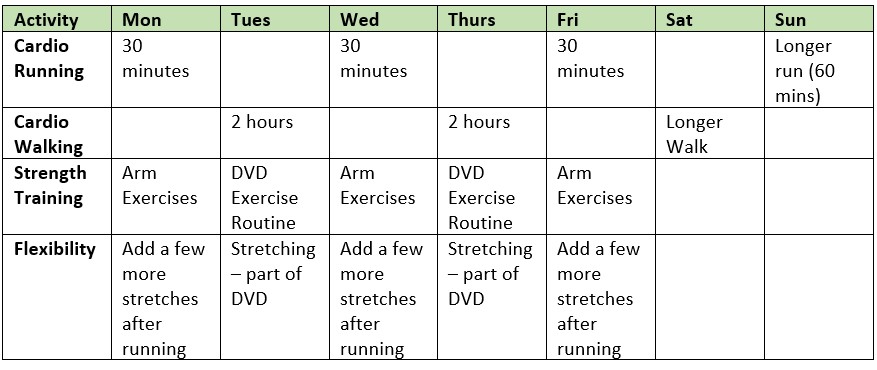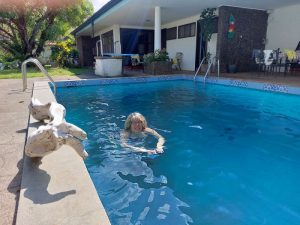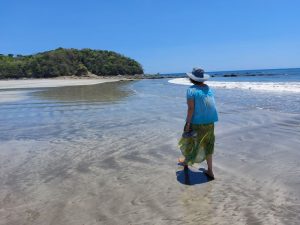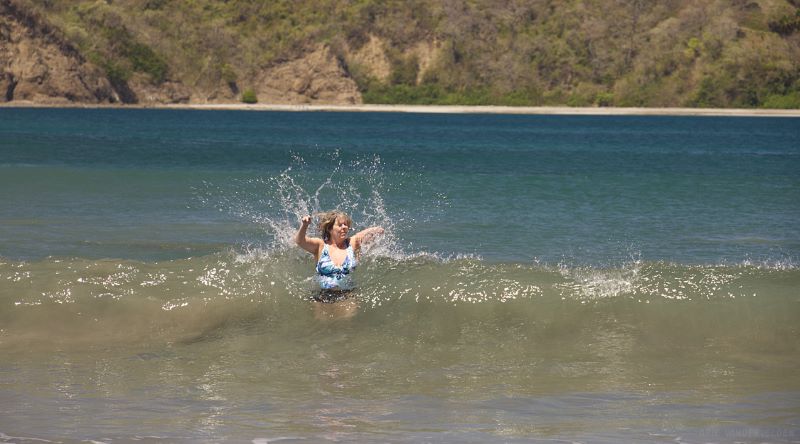Does Increasing Physical Activity Make You Feel Better?
If you remember from last month’s blog I had scheduled:

The question then becomes did I do it?
And the answer is yes and no.
I went away for 2 weeks in March to Costa Rica and this really disrupted the routine.
But, instead of running, I was doing beach walks (around an hour), swimming in the pool (30 – 40 lengths each time) and going in the ocean and playing in the

waves.
Did I get my heart-rate up? No, not really.

So, I am not so sure how much physical improvement I had month over month. But my mental health improved drastically. The sound of the surf ebbing in and out combined with looking at the green, lush jungle and feeling the sun on my face elevated my mood tremendously.

It is amazing what your environment can do for your mental health.
Were any new habits established?
Yes, I did incorporate, before and after, I came back from my trip, doing arm lifts with weights. I added this to my stretching and exercise routine after running. I will keep doing this.
Other then that I did not do more stretching or longer runs.
I will re-group and try to find a rhythm again in my schedule for walking and running and then gradually add some of the other exercises.
How long does it take to form new exercise habits?
There is a popular idea out there that it takes 21 days to make a habit. Assuming you engage the new behavior every day, a three-week commitment seems pretty manageable.*
“Unfortunately, that 21 days idea is a myth. …anyone who makes a general claim like that is lying: There are too many unknown variables, and so it is simply an incalculable equation.”*
One of the variables is the reward value of the behavior. …Anything that provides our brain with intense feelings of pleasure is going to be learned fast, which is why many of us already have a set of habits we’d like to change to begin with.*
On the other hand, for most of us going to the gym is not immediately pleasurable and it’s going to take a lot of work to habituate that behavior. Another is the reward value of our pre-existing habits. Chances are that our brain has already learned a lot of highly rewarding habits and those are stiff competition for the new thing we are trying to learn.*
Also, how complicated is the behavior?
Simple behaviors are easier to habituate than more complex behaviors. Sitting on the couch is incredibly easy, especially when the alternative is getting our butt in the car and driving that car to the gym to work out.*
So, What Can You Do to Form a New Habit?
The process of building a habit can be divided into four simple steps: cue, craving, response, and reward.**
-
The Cue – The cue triggers your brain to initiate a behavior. It is a bit of information that predicts a reward.
For example, I wanted to walk on the beach for an hour, as it felt good, I enjoyed the scenery and the reward was all of my senses coming alive. I love the tropics and since I do not live in this environment, being in this situation is a reward in itself!

Okay, so that is a good habit and not so difficult as I already like the action.
What if I wanted to break a habit?
-
The Craving – A craving is some level of motivation or desire—without craving a change—we have no reason to act. What you crave is not the habit itself but the change in state it delivers.
For example, say I wanted a drink at the end of the day. It is not the drink I crave, but wanting to relax after a stressful day.

To break this habit, I would need to make it difficult to do this habit by not having alcohol in the house, substituting another activity to de-stress to create the reward of relaxing. If I took this one step further, I would try to eliminate the cues (stressful events) that trigger the craving. This is much more difficult, as we can never totally eliminate stressful events from our lives. It is better to look at the coping mechanisms!
-
Response – The response is the actual habit you perform, which can take the form of a thought or an action.Whether a response occurs depends on how motivated you are and how much friction is associated with the behavior. If a particular

Drinking the morning coffee in Costa Rica! action requires more physical or mental effort than you are willing to expend, then you won’t do it.***
For example, the cue or trigger happens, e.g. wake up tired and the craving is coffee, the response would be to make a pot of coffee and drink a cup, with the reward being a shot of energy.
So, if I wanted to change the habit of drinking coffee, I would have to make it difficult to have coffee and make it easy to do an alternative action. (Going for a morning walk). Note: For changing step 1 the cue, feeling tired, I would have to address the root cause.
Why am I tired? What are my sleep habits? Can I improve my sleep?
-
Reward – Rewards are the end goal of every habit. The cue is about noticing the reward. The craving is about wanting the reward. The response is about obtaining the reward.***
Your brain is a reward detector. As you go about your life, your sensory nervous system is continuously monitoring which actions satisfy your desires and deliver pleasure.
For example, if the coffee did not do anything for me, e.g. make me feel more awake, I probably would not drink it in the morning.
How to Apply this Information to Making habits with Physical Wellness
Whenever you want to change your behavior, you can simply ask yourself:
- How can I make it obvious?
- How can I make it attractive?
- How can I make it easy?
- How can I make it satisfying?***
Essentially what you are doing is making a positive feedback loop. For example, if you wanted to make a habit of stretching more, at least 2 times a week, you could:
- Make it obvious – lay out your exercise clothes the night before, so when you get up, they are right by your bedside and it takes no effort to put them on.
- Make it attractive – possibly try to have nice soothing music and for example an instructor online who is doing stretching on the beach. Create an attractive environment for your senses.
- Make it easy – Have a space that is comfortable for stretching and the set-up takes no thought to implementing, e.g., the video is downloaded and everything is ready to go.
- Make it satisfying – this is the reward. Do you have less tension in your shoulders or less pain? Do you follow this activity with a healthy breakfast that starts your day off well? These are only examples, and it will be different for everyone.
Although, I did not increase my physical activities, writing this summary blog did increase my motivation to keep going with activities and look more in depth with some of the habits I am trying to form, i.e. why am I doing it and what is the reward.

I hope this wrap-up has helped you and I would love to hear your comments.
Live well,
Diana
Sources:
*King Brian, Psychology Today, Jan 2, 2022, How long does it take to form a new habit?, https://www.psychologytoday.com/ca/blog/taking-it-easy/202001/how-long-does-it-take-form-new-habit
**The Power of Habits by Charles Duhigg
***Clear James, (n.d.), How to start habits that actually stick, https://jamesclear.com/three-steps-habit-change

Hi Diana,
I really like reading your blogs. I am a huge believer in moving, whether it is a little or a lot. As long as some effort is put in. So even the idea that you are going to try and incorporate more exercise into your life is a step forward!
Thanks Karen, for your comments! It does make a huge difference on how I feel, when I get outside for a run or walk versus the days I don’t.
If I remember correctly, you had told me that you instruct yoga. I would imagine that this a great way to de-stress, gain flexibility, and build strength. Are you still yoging (not sure if this a word), but I liked the sound of it!
Take care,
Diana